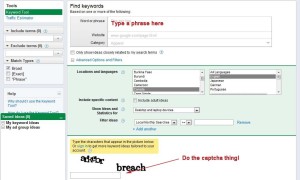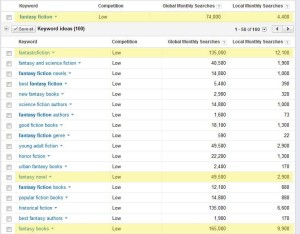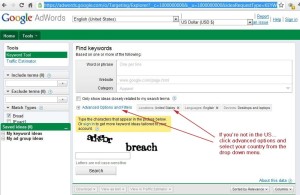
When I mentioned yet another post about SEO to the fellow minions they suggested, relatively politely, that I might explain why anyone should care. We have already had splendid examples of great SEO advice, here for example, but it bugs me that most writers still aren’t playing the SEO game to its full advantage. And I care, so there.
I know that most of us are on Amazon, Goodreads etc and people who like books find us that way. We have lively blogs, they gain loyal fans and your fame spreads by word of mouth…but people Google for books too. If they already know your name or your book title they can usually find your website but suppose they just want ‘fantasy fiction’? I just Googled it, not a single author on page 1. And yet 165,000 people Google for fantasy books per month. Book Reviews? 1,500,000 searches per month, and not a single reviewer’s blog on page 1. People are looking for you and they can’t find you. How do I know? I’ll show you later.
Why say it again though? And why now? Everyone’s read loads of articles on SEO and they all disagree with each other. Here are a few secrets:
1) Google changes the algorithm for ranking websites about twice a year to try and outwit sad geeks like me, so the rules keep changing.
2) Sad geeks like me don’t usually spill it all. And neither does Google.
3) Search Engine Optimisation is merely about making it easy for search engines to find you. It doesn’t have to be arcane and complex but people’s livelihoods depend on making it seem so.
4) In a constant battle with the blackhatters (people who use naughty methods to blanket page 1 with their own sites) Google has produced a new algorithm, lovingly nicknamed The Penguin, which has rendered useless a lot of the techniques used by the whitehatters (people who use clever methods to blanket page 1) which is actually good news for normal people who just want to SEO a decent website and not take over the world.
5) A few principles stay the same.
So, here are some explanations. You may not want to care about any of this yourself but anyone with a website has expended either a lot of time or a lot of money. To get the most bang for your buck it’s worth knowing that if your web designer doesn’t beat you about the head with the stuff that comes next, they don’t get SEO.
Writers have two very specific problems with SEO, firstly, your name and your books are your brand, so of course you want www.mynameandmybooktitle.com for your domain name…but Google can’t interpret that. For SEO purposes you really need something like www.bestfantasywriteroffantasybooksandnovels.com because that’s what people look for, but you wouldn’t want to hand that out on a business card to fans and agents.
Solution: get both. Domain names are cheap, hey get six. You can copy the same site onto each, with just a few changes on each page so that Google doesn’t see them as clones. (The Penguin abhors a clone. It’s made a load of extra work for me.) Even better, have a static html site for you and your books and the SEO-friendly domain name for your kickass blog that you update all the time. The Penguin loves blogs, it sees regularly updated content as the sign of a genuinely valuable site.
The second problem writers have with SEO is they are proud of their writing. There is a fine line that some of us tread between writing for people and writing for machines, but generally if you ask a writer to ‘add more key phrases’ to their carefully crafted prose they will wimper noisily before downing a bottle of brandy and looking for something to poke your eyes out with.
Solution: don’t even try to SEO your mynameandmybooktitle site. Keep it for your pure prose and bastardise the other one…just a little. I’ll be telling you how to write SEO-rich content that reads nicely and doesn’t shame a writer in Part 2.
Before any of that though, we need to talk key words because that’s where it all begins. These are the phrases you use as signposts for Google, and the other search engines, to tell them what your site is about. Whether you want a static site, a blog or both, your key words need to define both your domain name and your site layout.
And this is the biggie. The shout-it-from-the-rooftops, ‘No, not like that, like this,’ thing. Don’t devise the key words yourself, let the Googling public do it for you. There is a free tool offered by Google that shows you what people search for. You can see how many searches are made on loads of related phrases. It calculates searches local to your country as well as globally and it tells you how much SEO competition each phrase has from others in the business.
I’m going to show you how it works. If you don’t like screenshots, scroll to the conclusion at the end, but remember, anyone who is going to SEO a website for you should start right here.
If you follow that link you get to a page that looks like this:
The default for local searches is the US but if you live elsewhere you can just click Advanced Options and select the country you live in. I’ve selected Canada. Then your screen will look like this: Think of a phrase (always more than one word) that describes your work. ‘Editing services’ maybe or ‘historical erotica’…’wasp stories’ or ‘books about bikers’, anything you like. I’ve stuck with ‘fantasy fiction’ because the results were kinda interesting. Fill in the captcha and click, to get a screen that looks like this:
Think of a phrase (always more than one word) that describes your work. ‘Editing services’ maybe or ‘historical erotica’…’wasp stories’ or ‘books about bikers’, anything you like. I’ve stuck with ‘fantasy fiction’ because the results were kinda interesting. Fill in the captcha and click, to get a screen that looks like this:
 It goes on and on, my screen print gave up here. I’ve highlighted some interesting features but the one that sticks out like a pork pie at a barmitzvah is that there is zero competition. Nobody in the fantasy fiction field has a website optimised for the phrase, um, ‘fantasy fiction’. Which is why there are precisely zero authors on page 1 of a Google search.
It goes on and on, my screen print gave up here. I’ve highlighted some interesting features but the one that sticks out like a pork pie at a barmitzvah is that there is zero competition. Nobody in the fantasy fiction field has a website optimised for the phrase, um, ‘fantasy fiction’. Which is why there are precisely zero authors on page 1 of a Google search.
In to the details, ’fantasy fiction’ itself has 74,000 global and 4,400 searches per month, not too shabby, but ‘fantasy books’ has twice as many, both global and local. Who knew? Chuck ‘fantasy books’ in your key word mix and you double your potential hits. Now that I’ve done a bit of research, I’d be looking for a domain name along the lines of www.fantasybooks.com instead of my original guess.
What else? For some reason ‘fantasticfiction’ has a load of searches as well, beats me why but there you go. Let the punters tell you what they want. I’d be chucking ‘fantasticfiction’ in my website too. Ideally you want about half a dozen key word phrases, and this is the only effective way to select them. If you write different genres, or do different things, collect up one or two for each topic. Play with it, have fun. Or not, but make sure your web designer does.
In Part 2 we’ll be looking at content, landing pages and where the hell tags fit in.


Fantastic! I can’t wait to try this! Thank you, Carolyn.
Have fun!
Great advice, Carolyn. This is one of the techniques I was PAID to do in Boston when I worked for an SEO company. I hope everyone realizes how valuable this is.
Indeed, keeping some stuff quiet is big business.
Definitely gonna check this out. Thanks, Carolyn.
I twigged we needed a post when i was ferretting about to see what your keys could be Yvonne, and the total lack of competition blew me away.
Whoa! This is fabulous stuff. Thank you!!
Glad it made sense Sheri. Enjoy your search.
So…if I just have a blog, and not a website-with-blog, I can just wait for Part II, right?
Lol, yes and no, you might want to play with key phrases anyway, they can always get sneaked into sidebars and posts. 🙂
So do search engines look in wordpress pages like About? Can keywords go in there or do we need to sneak them into every post we write? Can’t wait for Part II
Ah, you’ve sussed the next bit! Best way is to set up a static landing page for your core keywords, then your posts can be a lot freer. How to do that is part of part 2.:-)
Yeah, echoing everyone else. Excellent stuff, Carolyn.
Yeah, one of my minor missions in life to try and ungeek the geeky. 🙂
I need to reread this wonderful advice tomorrow morning and use it.
Thanks!
Great wake-up call, Carolyn.
Is it just me or are the screen-shots blurred? I am not able to read them.
They aren’t the best resolution, humble apologies, but if you right click the image and ‘open in new tab’ you can get them full screen size. 🙂
I think this all sounds fantastic though not sure how much of it I understand yet but will try to get to grips with it and send it to my DH who did my website for me. It needs updating so perhaps this is a good time to implement your SEO advice. Thanks.